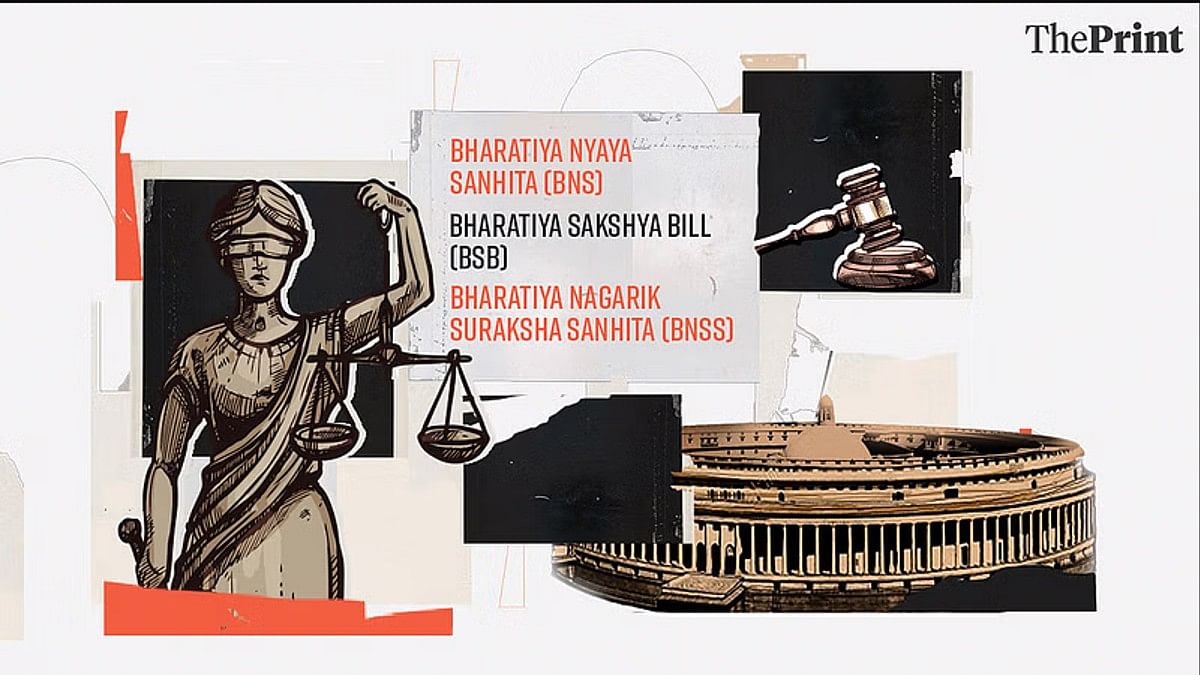New Delhi: The three new criminal laws which replace the Indian Penal Code (IPC), Code of Criminal Procedure (CrPC) and Evidence Act, will come into effect from 1 July throughout the country, the Ministry of Home Affairs notified Saturday.
At the same time, the government has put on hold implementation of Sub Section (2) of Section 106 of Bharatiya Nyaya Sanhita, which relates to “causing death of a person by rash and negligent driving of a vehicle”. This provision provides for a punishment of “0-10 years” in “hit and run” cases, something that had sparked protests and strikes by transporters, including bus and taxi unions.
Transporters raised concerns that the offence provides for very stringent punishment — 10 years imprisonment and Rs 7 lakh fine — even where the accidents are unintentional. They argued that it also overlooks their working conditions as accidents may be caused due to fog and poor visibility and the fact that stopping at the spot of accident could put them in danger of being beaten up or even lynched by the public.
The Government, however, had later clarified to the transporters that the aim of the strict law is to deter accidents and instill a sense of accountability. The government had said that in case a driver is unable to stop at the spot of the accident, he or she can go to a safe place and then make a call to the police informing them about the accident. If a driver accidentally hits someone and informs the police on time, then he or she would face a lesser punishment of five years, the government said.
The provision, despite discussions, has now been left out.
“In exercise of the powers conferred by sub-section (2) of section 1 of the Bharatiya Nyaya Sanhita, 2023 (45 of 2023), the Central Government hereby appoints the 1st day of July, 2024 as the date on which the provisions of the said Sanhita, except the provision of sub-section (2) of section 106, shall come into force,” the MHA notification, seen by ThePrint, read.
The three bills were first introduced during the Monsoon session of Parliament in August 2023. After the Standing Committee on Home Affairs made several recommendations, the redrafted versions were introduced in the winter session and passed by both houses.
Also read: 3,000 trainers, a task force, forensic vans: This is how 3 new criminal laws will be implemented
‘Broad definition of terrorism, timelines for judgments, forensic push’
Among the key changes are that BNS 2023 has significantly broadened the definition of terrorism. Under the new law, any damage or destruction to property intended for the defense of India or any other governmental purposes, even if done in a foreign country, will be classified as an “act of terror”. In another significant addition, threat to “economic security” is also included as an act of terror.
The new law specifies that any act conducted with an intent to threaten or likely to threaten the unity, integrity, sovereignty, security, or “economic security” of India, will be considered an act of terror.
According to the law, damaging India’s monetary stability by engaging in production or circulation of counterfeit currency is categorised as an act of terror.
Moreover, under the new law abduction or detention of a person to influence the government of India, a state government or government of any foreign country, will also constitute an act of terror.
The new BNS 2023 also introduces provisions for life or death sentences for offences linked to mob lynching and hate-crime murder.
In addition, mandatory videography during search and seizure by the police, issuance and execution of summons and warrants electronically and examination of complainants and witnesses using technology for speedy trials — these are some of the major provisions that are part of the new laws.
Another major addition to the law is that a forensic examination will be mandatory in cases with offences that are punishable with imprisonment of seven years or more. A videography of the process is also made mandatory.
The new Bharatiya Nagarik Suraksha Sanhita, has also prescribed specific timelines for time-bound investigation, trial and pronouncement of judgments.
‘Erasing the symbols of colonialism’
Speaking in the Lok Sabha, Union home minister Amit Shah had said that the new laws are in consonance with the “spirit of the Constitution and have been brought keeping in mind the well-being of the people of the country.”
While presenting the bills, he had said that the government has focused on “erasing the symbols of colonialism”. He said that the existing “British-era laws” were aimed at protecting “British Raj”, while the new bills have a “human-centric” approach and are to protect the people and the country.
Shah said that the colonial-era laws prioritised acts of “looting the treasury”, “uprooting rail tracks” over crimes against women and children, human rights, border security, which has now been done away with.
(Edited by Zinnia Ray Chaudhuri)
Also Read: New criminal law bill broadens definition of terrorism, now includes ‘threat to economic security’

